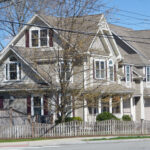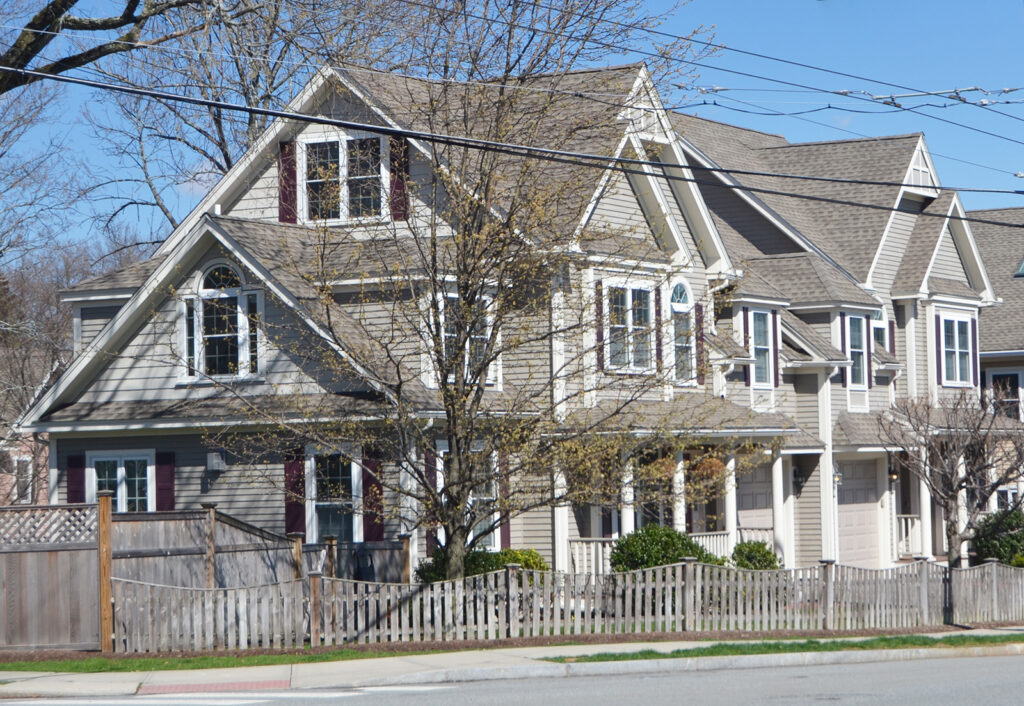
By Rachel Heller and Thayer Donham
Belmont residents have yet another great opportunity to shape the future of our community. Under a new state law, Belmont will be creating districts where multifamily housing can be built. The multifamily zoning requirement for MBTA Communities, also known as Section 3A of the Massachusetts Zoning Act, requires municipalities with good access to transit to have zoning in place that allows for up to 15 apartments or condominiums per acre.
The Multifamily Zoning Districts must be approved by Town Meeting by December, 31, 2024, and meet the following requirements:
- Comprise a minimum land area of 28 acres
- 50% of the minimum land area must be within .5 miles of a commuter rail station
- Any other multifamily zoning districts needed to meet the requirement must be areas of at least 5 acres
- Average 15 units per acre across the district and sub-districts
- Rezone to allow for 1,632 homes to be created.
- Early in 2023, Belmont received a grant for technical assistance services from the Metropolitan Area Planning Council (MAPC), the region’s planning agency, to assist the town with developing and adopting new zoning districts by the deadline.
This law was adopted to provide more homes for people, sustain economic growth, and increase inclusivity. Here in Belmont, this new law can advance key goals for our community beyond increasing affordable housing, such as supporting local businesses, growing our commercial tax base, reducing our carbon footprint, relying less on cars, and fostering diversity.
With the involvement of many members of our community, the Housing Trust recently completed Belmont’s new Housing Production Plan (HPP). The HPP, which has been approved by the Planning Board, Select Board, and the state’s Executive Office of Housing and Livable Communities, states that many Belmont residents need more affordable housing options.
Median housing costs in Belmont are far above what many current or prospective residents can afford, and most people who work in Belmont cannot afford to live in town. A household would need to earn $94,000 to afford to rent a two-bedroom apartment and earn more than $325,000 to buy a single-family home. Households with very low incomes and seniors living alone are most likely to pay more than 30% of their income for housing. Over the last five years, more than 300 mixed-income apartments have been built or permitted in Belmont, and those developments have a percentage of homes set aside for households earning less than 80% of the area median income and in some cases lower than 80% area median income. Despite the progress in providing affordable housing in Belmont, there is still less than one affordable home available for every four eligible households.
Belmont is taking a thoughtful approach to the MBTA zoning that brings various perspectives together and provides multiple opportunities for community input. In 2022, the Select Board appointed the Belmont MBTA Communities Advisory Committee. This committee brings together multiple town committees and boards to ensure that new multifamily zoning districts will help advance our town’s goals for affordability, economic development, historic preservation, and diversity, equity, and inclusion. The committee is co-chaired by Rachel Heller (Belmont Housing Trust) and Roy Epstein (Select Board). Other members include Drew Nealon (Historic District Commission), Paul Joy (Economic Development Committee), Julie Wu (Diversity, Equity, and Inclusion Implementation Committee), and Thayer Donham (Planning Board). Gabriel Distler, staff planner, is a member of the team.
Belmont has many options
There is a lot of flexibility in how we design these districts, and everyone in Belmont is invited to help.
- We can allow for more density over smaller areas, lower levels of density across larger areas, or allow for a mix of building types with varying levels of density.
- The law requires an average of 15 units per acre and defines multifamily housing as a building with three or more dwellings. Belmont could establish zoning that allows for larger or taller apartment buildings in areas around transit and commercial districts and triple deckers in other spots.
- We can allow for mixed-use development where we have homes above businesses in areas throughout town. By focusing new housing near trains, buses, and businesses, residents can get around without always needing a car and we can grow our commercial tax base with more customers in and around our commercial areas.
Opportunities for input
Community input is vital to making these decisions since there are many ways to implement this law to meet the needs of the town. Belmont’s MBTA Communities Advisory Committee and the MAPC project team have been meeting frequently and held a public forum in June at the Beech Street Center. More than 100 people attended in person and virtually, and provided comments, asked questions, and made suggestions regarding where various densities of housing should occur using maps of districts around town.
The MAPC team is now synthesizing the information and will present their findings for discussion at an upcoming meeting of the MBTA Advisory Committee. The MAPC website and the town of Belmont website will post the findings for review by all.
Another nother public forum is in the works for the fall, and the public is welcome at all the MBTA Advisory Committee’s meetings.
The Planning Board will consider the committee’s recommendations before a zoning bylaw change proposal is brought before Town Meeting. The committee aims to have this proposal ready for the annual Town Meeting next spring.
This is an important moment for Belmont. Working together, we can implement this new state law and put the town on the path to a healthy future by adding new housing options, providing more foot traffic for our local businesses, reducing the need for residents to drive by putting more homes near transit, and preserving our historic and small town character. Look for the the Belmont MBTA Communities Advisory Team meeting schedule at www.belmont-ma.gov/mbta-communities-advisory-committee.
Rachel Heller and Thayer Donham are both members of the Belmont Housing Trust and the MBTA Communities Advisory Committee.



Sorry, the comment form is closed at this time.